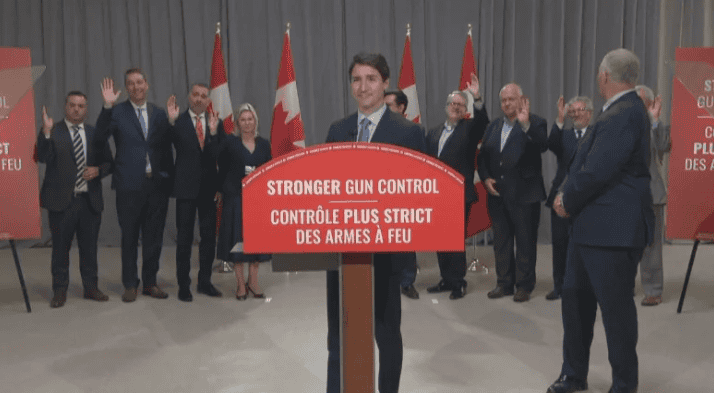
Trudeau touts ‘assault’ firearms ban — even though handguns account for more homicides
Liberal Leader Justin Trudeau had mayors from the Greater Toronto Area on hand Tuesday as he touted his party’s vow to crack down on firearms — but all those assembled suggested the federal government should go further and promise a handgun ban.
After Trudeau delivered a speech extolling the virtues of banning semi-automatic “assault” rifles as a means to reduce gun-related crime, a reporter asked all the mayors — including leaders from major suburbs like Mississauga and Markham — to raise their hands if they’d support a national ban on handguns. They all did.
“I can tell you I heard clearly from [the mayors] that many of them want us to bring a national [handgun] ban,” Trudeau said afterward.
While rejecting the idea of a national ban, Trudeau promised a re-elected Liberal government would give individual municipalities the authority to ban or restrict handguns on their own.
But the reaction of the assembled mayors to a signature Liberal campaign pledge shows that some municipalities want Ottawa to do much more.
“We would obviously prefer that the handgun ban be national. They’re not prepared to go forward right now,” Mississauga Mayor Bonnie Crombie told reporters after the event. “But they have introduced other measures, including funding, enhanced funding, that will go directly to the cities and they are banning semi-automatic assault weapons.”
Asked why his party would pursue a limited ban instead of one covering handguns, Trudeau punted the question. “We are taking the strongest step in Canadian history to move forward on tougher gun legislation,” he replied.
NDP Leader Jagmeet Singh also has proposed giving municipalities the power to ban handguns. Conservative Leader Andrew Scheer has said these policies would do little reduce gun violence because they target legal firearms owners instead of criminals. Scheer has promised what he’s calling a tough-on-crime approach to gangs, including new bail restrictions and longer sentences for gang-related offences.
Instead of a cross-country handgun ban, the Liberal Party has promised to pursue a ban on “military-style assault rifles” like those used in recent mass shootings in the U.S.
“These guns are designed to inflict mass casualties and have no place in Canada. Canadians are tired of excuses and know that ‘thoughts and prayers’ don’t make our communities any safer,” the Liberal platform reads.
Most gun-related homicides in Canada — 65.3 per cent of the total in 2018, according to Statistics Canada — are carried out with handguns.
While police don’t have accurate data on the origin of crime guns, hundreds of guns are confiscated by the Canada Border Services Agency (CBSA) every year as gang members procure illegal firearms from the U.S. to carry out their crimes.
‘Military’ and ‘assault’ style firearms to be banned
The Liberals haven’t said which firearms would be classified as “military” or “assault” style according to their policy. As it stands, those terms have no legal definitions.
Trudeau said Tuesday he’d rely on the advice of experts to determine “which guns are which.”
A re-elected Liberal government would offer owners of such military-style weapons a “buyback program” at “fair market prices” for firearms legally purchased in Canada.
There are more than a million restricted and prohibited firearms in Canada. But not all of them are considered “assault” weapons — making it very difficult to estimate the potential cost of a buyback program.
For a similar program, New Zealand Prime Minister Jacinda Ardern earmarked $125 million to buy back about 175,000 firearms in that country.
Canada’s current classifications are based not on how menacing a particular firearm looks but rather largely on its physical characteristics.
For example, all handguns and some semi-automatic firearms are already classified as “restricted” under Canadian firearms law, meaning they must be registered with the provincial chief firearms officer.
To legally own a restricted firearm, an owner must go through a lifetime background check — which can take months — complete a weekend training course and then pass a test to be eligible for a possession and acquisition license (PAL) with restricted privileges.
After passing the test and buying a firearm, the owner must then also obtain an Authorization to Transport (ATT) from the firearms officer each time they want to carry the gun to any place other than a government-approved gun range.
A person can only legally shoot a restricted firearm if they have a license, or if they’re under the direct supervision of an adult who has one of their own.
Moreover, under existing Canadian law, high-capacity magazines — which have been used south of the border in multiple mass shootings — are illegal already. So are fully automatic firearms that can unleash a flurry of bullets in seconds.
When asked Tuesday why he’s principally focused on firearms that are used less often in homicides, Trudeau pointed out there’s still a grim history of violence associated with such weapons — the 1989 Polytechnique massacre and the 2017 Quebec City mosque shooting being the better-known examples.
“We need to strengthen gun control in this country. And the choice is clear. Liberals are going to strengthen gun control. Conservatives want to weaken gun control,” he said.


